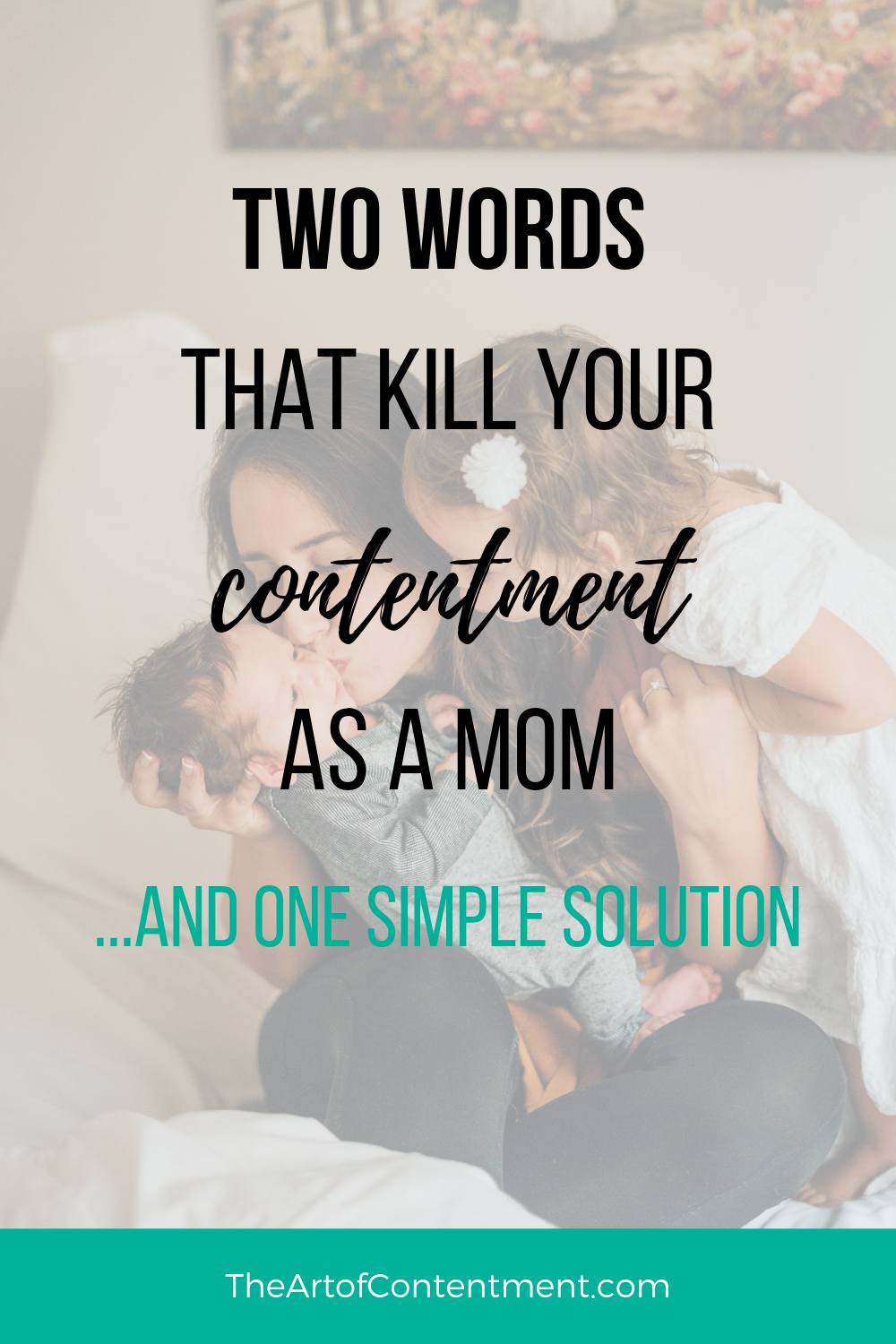 Two words sure to kill contentment: “I deserve.”
Two words sure to kill contentment: “I deserve.”
A furtive shadow cast on the floor alerted me. I whipped around just in time to catch my son running off with an apple. And not to eat it, either, that I knew. The fruit bowl was empty, so he’d been at this a while.
I tore after him, “Luke, don’t throw our fruit over the fence!” Not a backward glance. His gazelle legs sailed through the back door and carried him across the lawn. Then a red dot rose over the fence and disappeared into the trees. “Time out, mister!” He took his time coming back now that the fervent urge to chuck fruit had been satiated. For now.
Not long ago, incidents like this would stack up throughout the day until I exploded. I yelled and my kids, usually the oldest one with autism, ignored me. My kids ought to obey me when I told them to stop this or do that, shouldn’t they?
Yelling displayed my righteous indignation at being disobeyed. I yelled to regain control. But, despite my frustration and anger, I actually felt little control over my household.
I was more like a prisoner with two hapless guards who just didn’t know when to stop poking the dragon.
I was tense and snappy with my sons and rarely enjoyed activities with them because I was sure that trouble was about to break through the happy façade. If things were peaceful, then mayhem was snickering around the corner. I felt sorry for myself. I felt like a victim of my children’s whims, abused and out of control.
This was our daily routine but it’s not anymore. Something changed.
What changed is when I caught myself saying something out loud, something that until then was an attitude, a pervasive belief I hadn’t realized enslaved me:
I heard myself say, “I shouldn’t have to police my kids like this!”
And I firmly believed it. I shouldn’t have to stand over my kids and teach them to obey. I deserved to rest after a tough day instead of jumping up – again! – to pull Luke off the window sill or retrieve the screwdriver he’s using to remove the screws from our light switches. I ought to be able to watch a movie without pausing it 15 times (yes, 15) to break up squabbles.
“I shouldn’t have to police my kids like this!”
Then a wise aunt said, “Of course you have to police your kids. It’s called parenting.”
Bingo.
I deserve…I shouldn’t have to…I ought to…
“I deserve” were two words I needed to drop from my parenting vocabulary if I wanted to be a content mother.
Slaying the Dragon: Begin the battle against “I deserve” by understanding the enemy
When I confronted my “I deserve” attitude, I learned a few things that helped me understand the enemy and then slay it.
I deserve…I shouldn’t have to…I ought to…These are all phrases of entitlement. Once I felt entitled, then I felt resentful when I didn’t get what I wanted. Toddlers do this and so do their mamas.
Entitlement sets a false standard for motherhood that’s destined for disappointment. You know what? My child didn’t deserve all the challenges of autism, but he’ll work extra hard to adapt so he can be a happy, godly man. Yet somehow I thought I deserved to parent from the couch. You know what parenting from the couch looks like? Chaos. Yelling. Because if I took off my Princess Entitled crown and got down to the dirty work of parenting, then I wouldn’t have to yell. Yelling parents are parents who control their children by intimidation and frustration instead of the exhausting, patient work of teaching obedience.
Saying goodbye to “I deserve” gives everyone a blank slate. My kids have no idea what I think I deserve. In fact, they’re usually absorbed in their own “I want” and “I deserve” and just caught up in the work of childhood: playing. Too often I viewed their disobedience as purposely intended to drive me crazy. But it was never about me. Now that I’ve dropped “I deserve” from my expectations for my kids, they are no longer striving to achieve a standard they didn’t know they were supposed to meet. “I deserve” created resentment in me and put my kids at an unfair disadvantage. Now everyone has a blank slate and we meet the new day on equal footing.
Extinguishing entitlement put the parent-child relationship back in the right order. “I deserve” made parenting too much about me. How I felt, how I hurt, how I was disappointed. But parenting is not about improving the parent but about training the children. The focus should be on the kids, and both parent and children will reap the rewards of patient nurture.
“I deserve” must give way to what our kids deserve: a mother who is committed to training, nurturing, and teaching their pliable minds and souls. It worked for my family.
How do you know if you have an “I deserve” attitude?
The “I deserve” attitude usually expresses itself as resentment. In some way, we are resentful because our standard wasn’t met. Someone failed us and it hurts. Over time, that hurts hardens into resentment. My resentment was channeled into yelling, but yours may look different. Instead of yelling, you may withdraw from your kids. No matter what form “I deserve” takes, the underlying emotion is resentment.
A simple solution to slay the dragon
My “I deserve” mentality meant that I gave verbal instructions and repeated them louder and louder as they went unheeded. But yelling didn’t work – it only served as a stage for my frustration.
Blessedly, the solution was simple:
- I gave a verbal instruction once, then I closed my mouth. (I don’t get this right 100% of the time and neither will you; give yourself grace here.)
- If my kids ignored me or directly disobeyed, then I warned them with a consequence as I stand up or set aside the dishes and move toward them. Usually they comply. (If you use the 1-2-3 counting method, then you give the instruction on 1, and stand up on 2 if they aren’t moving to obey.)
- But if it’s a tough day and they’re determined to have their own way, then they go to time out or whatever consequence I threatened. And I make sure they understand why they’re in time out: “You’re in time out because you walked on the table when mommy told you no. Elias doesn’t walk on the table, okay?”
We’ve all heard of this behavior training method. It’s simple and it works. It allowed me to regain parental control (not to be confused with control-ling) and set me firmly into a leadership role with my boys. Since I consistently reinforced consequences, my boys learned to trust me and to believe me.
The power behind this simple habit is consistency. Every time. Whether I feel like it or not. Whatever behavior issues you are retraining in your family, consistency is key. Your efforts will fail if you fail to be consistent. Drop what you’re doing to reinforce consequences. Every time. Whether you feel like it or not. Soon your kids will believe you the first time and you’ll won’t have to get up from rest or walk away from chores to reinforce consequences. It slayed the dragon in our family.
Our house used to clamor with hollering and shouting, but now our days look more like this:
When Luke, my oldest son, pulls his wagon out to the road – big no no – I get up, tell him to come inside, and reinforce a consequence.
If Elias, my younger son, decides to excavate the kitchen knives from the drawers, he gets one warning to walk away, not seven warnings of escalating loudness shouted from the couch. Then I leave the laundry unfolded or the table unpolished and reinforce a consequence.
The change has been amazing.
When I stopped believing that I shouldn’t have to, that I deserved, that the boys should…a peculiar thing happened: I grew happier.
Without a sense of entitlement, I no longer had a reason to be disappointed.
My frustration level went down.
My confidence as a capable mom went up. I was in control.
I yelled less, got up and reinforced more. My boys began to respond quicker and I had to threaten far less (by threaten, I mean declare a consequence).
Why? Mommy put her money where her mouth was and followed through. My kids believed me.
It took soul searching and journaling and acres of prayers to see myself in the scalding life of truth: I wasn’t a victim of my kids; I had made myself a victim through a false sense of entitlement. You don’t have to fall victim to this false attitude of “I deserve.” A few simple changes will bring greater peace to your home and your heart.
